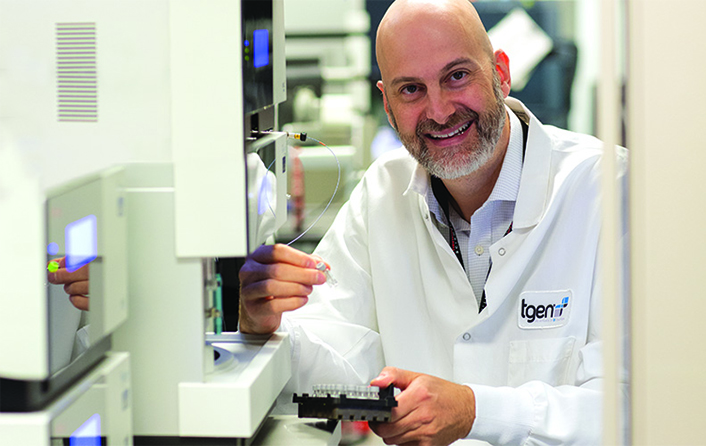
-
- Posted Tuesday January 26, 2021
TGen-led study results suggest a more accurate diagnostic for breast cancer
Proteomics-based technology could help verify mammography screening
PHOENIX, Ariz. — Jan. 26, 2021 — Breast cancer, even at its initial stages, could be detected earlier and more accurately than current techniques using blood samples and a unique proteomics-based technology, according to findings of a study led by the Translational Genomics Research Institute (TGen), an affiliate of City of Hope.
Patrick Pirrotte, Ph.D., an Assistant Professor and Director of TGen’s Collaborative Center for Translational Mass Spectrometry, and an international team of researchers developed a test that can detect infinitesimally small breast cancer biomarkers that are shed into the bloodstream from cells surrounding cancer known as extracellular matrix (ECM), according to the findings of their study recently published in the scientific journal Breast Cancer Research.
For decades, physicians have relied on mammography breast imaging to look for cancer in a quest to provide prevention, early detection and reduce deaths. But the unintended consequences of both false positives and false negatives have off-set the hoped-for gains of this inexact type of screening, including complications from surgery and cardiovascular disease, and unnecessary biopsies of what turn out to be benign lesions.
ECM is the network of molecules — including collagen, enzymes and glycoproteins — that provide structural and biochemical support to surrounding cells, including cancer cells. During the early stages of cancer, these proteins and protein fragments — which form the tumor microenvironment — leak into circulating blood.
“Our data reinforces the idea that this release of ECM components into circulation, even at the earliest stages of malignancy, can be used to design a specific and sensitive biomarker panel to improve detection of breast cancer,” said Dr. Pirrotte, the study’s senior author. “Using a highly specific and sensitive protein signature, we devised and verified a panel of blood-based biomarkers that could identify the earliest stages of breast cancer, and with no false positives.”
To establish this protein signature, researchers employed blood samples from 20 patients with IDC breast cancer, and from 20 women without cancer who nonetheless had positive mammograms but benign pathology at biopsy. These results were compared to five groups of individuals diagnosed with other cancers: ovarian, lung, prostate, colon and melanoma.
Because the number of ECM molecules in blood is relatively low, researchers relied on proteomics and new sample preparation enrichment techniques, including the use of hydrogel nanoparticles, to accurately detect cancer-associated biomarkers. This technique binds proteins from ECM associated with cancer proliferation, migration, adhesion and metastasis, or the spread of cancer from one part of the body to another. Many of these proteins had never before been observed in blood samples.
“Our study results show a high degree of specificity of those markers as circulating proteins in breast cancer patients,” said Khyatiben Pathak, Ph.D., a staff scientist in TGen’s Collaborative Center for Translational Mass Spectrometry and a study author. “Our results justify further studies with larger groups to evaluate whether this biomarker panel improves the positive predictive value of mammography for breast cancer detection.”
Contributing to this research were George Mason University, Centro di Riferimento Oncologico di Aviano, Istituto Superiore di Sanità, Università Cattolica del Sacro Cuore, Fondazione Policlinico Universitario, University San Raffaele, and Istituto di Ricovero e Cura a Carattere Scientifico.
Funding for this study was provided by TGen and George Mason University. Additional support was provided by: National Cancer Institute, U.S. Department of Health and Human Services, Italian Istituto Superiore di Sanità, and Italian Ministry of Public Health.
The study — Shotgun proteomics coupled to nanoparticle-based biomarker enrichment reveals a novel panel of extracellular matrix proteins as candidate serum protein biomarkers for early-stage breast cancer detection — was published Dec. 2 in the journal Breast Cancer Research.
# # #
About TGen, an affiliate of City of HopeTranslational Genomics Research Institute (TGen) is a Phoenix, Arizona-based nonprofit organization dedicated to conducting groundbreaking research with life-changing results. TGen is affiliated with City of Hope, a world-renowned independent research and treatment center for cancer, diabetes and other life-threatening diseases: CityofHope.org. This precision medicine affiliation enables both institutes to complement each other in research and patient care, with City of Hope providing a significant clinical setting to advance scientific discoveries made by TGen. TGen is focused on helping patients with neurological disorders, cancer, diabetes and infectious diseases through cutting-edge translational research (the process of rapidly moving research toward patient benefit). TGen physicians and scientists work to unravel the genetic components of both common and complex rare diseases in adults and children. Working with collaborators in the scientific and medical communities worldwide, TGen makes a substantial contribution to help our patients through efficiency and effectiveness of the translational process. For more information, visit: tgen.org. Follow TGen on Facebook, LinkedIn and Twitter @TGen.
Media Contact:
Steve Yozwiak
TGen Senior Science Writer
602-343-8704
[email protected]


